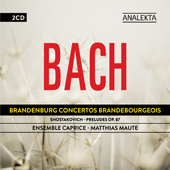
ESSENTIAL RECORDINGS

The Brandenburg Concertos belong to the family of the concerto grosso, also known as concertos for various instruments. They are clever,
spirited, bold and extremely well built. Their workmanship and perfect balance between solo and ensemble writing make these the highest point in the history of the
concerto in its old form. They are probably some of the most studied, puzzled-over and scrutinized works of the Baroque period, if not the whole of music, and have been performed
and recorded so many times as to make the head spin, by some of the best musicians in the business. All factors that make the prospect of writing a review of yet another
new recording of these iconic masterpieces a trepidatious endeavour.
My own very first recording (on vinyl of course) of Johann Sebastian Bach's chef d'oeuvre was with the Munich Bach Orchestra conducted by
Karl Richter on Deutsche Grammophon's Arkiv label, released in 1967. It was a landmark interpretation and remains highly respected to this day. But things have changed drastically over the last 45 years. For
good or bad, music performance is no longer reserved for a chosen few. With the rise of music superstars and the ever growing proliferation of classical music labels, it
seems everyone's had a shot at the Brandenburg Concertos, including some leading conductors like Gardiner, Harnoncourt, Hogwood,
Karajan, Klemperer, Marriner, Pinnock, Suzuki, and top-notch ensembles like Café Zimmermann, Il Giardino Armonico, Musica Antiqua Köln and Tafelmusik. So everytime
a new contender steps up to the ring, they either need to have brass knuckles inside their gloves, feel suicidal, or be damn good, the latter being the qualifying attribute for the
Ensemble Caprice led by Matthias Maute.
The first thing that strikes you in their playing, is a rhythmic vitality and buoyancy marked by incisive dynamics, fluid articulation and precisely judged accents, even
during the faster movements. Some of the other recent recordings out during the last five years or so, which sounded fine on first hearing now, after closer examination,
sound lazy compared to this new release on Analekta, a Montreal based classical music label. And when I say faster, what I really mean to say is alacritous
and brisk delivery. Even though they outpace the famous Il Giardino Armonico version for speed, and are pretty well on par with the infamous Musica Antiqua Köln rendition,
badly criticized for being too fast, the Ensemble Caprice still manage to make it all sound musically polished. (Someday, at this rate, an orchestra will
break the sound barrier while playing the final movement of No. 3). The instrumentation is clean and clear, in a recording where you can easily isolate the trumpet here,
the recorder here, the horns in the back and so on, without feeling that they've been spotlit for you, and with each and every musician playing in true Baroque spirit,
without exaggeration.
As an added feature, or attraction if you may to this CD is the inclusion of 7 numbers from the 24 Preludes and Fugues, Op. 87 by
Dmitri Shostakovich, arranged and orchestrated by Matthias Maute himself. One played before each concerto and one to finish
the set. Some of you may not see the logic behind this choice of companion filler pieces, or quite understand the concept, so maybe Maute's own motivation behind the
idea will better explain this: "When the Russian composer adjudicated at the International Johann Sebastian Bach Competition in Leipzig in 1950, he was
deeply impressed by Bach's two collections of the Well-tempered Clavier. Upon returning to Moscow, Shostakovich followed Bach's example and composed his own
cycle of preludes and fugues in all 24 keys. Even though he holds firmly to his own musical language with its tonal liberties, his use of baroque elements provides a
constant source of surprise. The rhythmic flow of the independent melodic lines seems to imitate Bach's vigorous use of complementary rhythms, thereby adding a
great sense of direction to both the preludes and the fugues. We have selected and orchestrated one prelude by Shostakovich for each of the Brandenburg Concertos.
The First Brandenburg Concerto, however, is preceded instead by a fugue, the wonderful fugue Op.87 No.7. As a touch of post-modern thought we have reserved the
prelude composed for this fugue to serve as a postlude at the end of the cycle of Brandenburg concertos. This short but utterly beautiful and contemplative piece
seems to be Shostakovich's final personal comment on Bach's overwhelming music, as seen from a contemporary point of view."
It works! I've listened to the Shostakovich opus in its original piano version many, many times, and even played a few of them myself, but have always failed to hear,
or rather feel, its "Baroque" or "Bach" influence until now. And the sound of period instruments certainly helps reinforce that image. One also has to remember that
as part of his routine, Shostakovich would play at least one piece of the German master every day. I can't think of a better way to introduce these pieces, or Shostakovich
for that matter, to the uninitiated.
Sound engineer Martha DeFrancisco has captured everything in flawless detail for this Analekta recording. I would recommend this equally for
anyone who doesn't already have a recording of the Brandenburgs, or for someone who already has 5 to 10 different versions. But I recommend it even more for the
added Shostakovich bonus.
Jean-Yves Duperron - September 2012